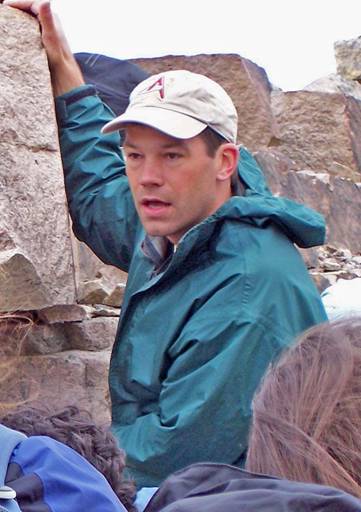James Madison University - Department of Geology & Environmental Science
Teaching Chaos and Complex Evolutionary Systems Theories at the Introductory Level
But First,
What is Complex Systems Theory?
Strategies and Rubrics for Teaching Chaos and Complex Systems Theories as Elaborating, Self-Organizing, and Fractionating Evolutionary Systems,
Fichter, Lynn S., Pyle, E.J., and Whitmeyer, S.J., 2010, Journal of Geoscience Education (in press)Complexity theory studies how non-linear systems with many agents (individual interacting units, like birds in a flock, sand grains in a ripple, or the individual units of friction along a fault zone), existing far from equilibrium, interact through positive and negative feedbacks to form emergent, interdependent, dynamic, evolutionary networks that increase in complexity, diversity, order, and/or interconnectedness with time.
What complexity theory demonstrates is that, by following simple rules, all the agents end up coordinating their behavior so that what emerges is not vernacular chaos (utter disorder and confusion), but recognizable patterns. Complex systems possess virtually all the properties of chaos systems (fractal, sensitive dependent, follow power laws, etc.), which is why we study deterministic chaos first, but add their own properties and behaviors.
Complex systems modelling is agent based — create n agents, assign each a few simple rules of behavior, and have them all interact with all simultaneously in a parallel processor. Experimentally, because the behavior of these systems is unpredictable, and we often want to explore how the behavior changes as various variables are tuned, computer simulation of the behavior with real time graphical output is a common strategy. It is difficult, maybe impossible, to understand complex systems deductively; their properties are qualitative and emergent.
These simulation properties of complex systems are expressed in the computational viewpoint, stated these ways.
- > The computational viewpoint in mathematics is the notion that to know a mathematical truth you must be able to compute it. That is, the outcome of an algorithm can only be known by calculating the algorithm.
- > Stuart Kauffman: The theory of computation is replete with deep theorems. Among the most beautiful are those showing that, in most cases by far, there exists no shorter means of predicting what an algorithm will do than to simply execute it, observing the succession of actions and states as they unfold. The algorithm itself is its own shortest description.
It is, in the jargon of the field, incompressible.
- > Heinz Pagels: The computational viewpoint of the Universe is that the material world and the dynamic systems in it are computers. The brain, the weather, the solar system, even quantum particles are all computers. They don't look like computers, of course, but what they are computing are the consequences of the laws of nature. According to computational viewpoint, the laws of nature are algorithms that control the development of the system in time, just like real programs do for computers For example, the planets, in moving around the sun, are doing analogue computations of the laws of Newton.
Examples of complex system models are boids, genetic algorithms, cellular automata, oscillating chemical reactions, and self-organized criticality and they have wide application in just about every discipline: physics, chemistry, biology, sociology, economics, etc.
Part of the complexity of understanding complex systems is that different mechanisms often work in concert. Broadly, however, complex system behavior fall into three categories: elaborating mechanisms, self-organizing mechanisms, and fractionating mechanisms.
 Lynn S. Fichter
Lynn S. Fichter
 Steve Baedke
Steve Baedke
 Eric Pyle
Eric Pyle
 Steve Whitmeyer
Steve Whitmeyer